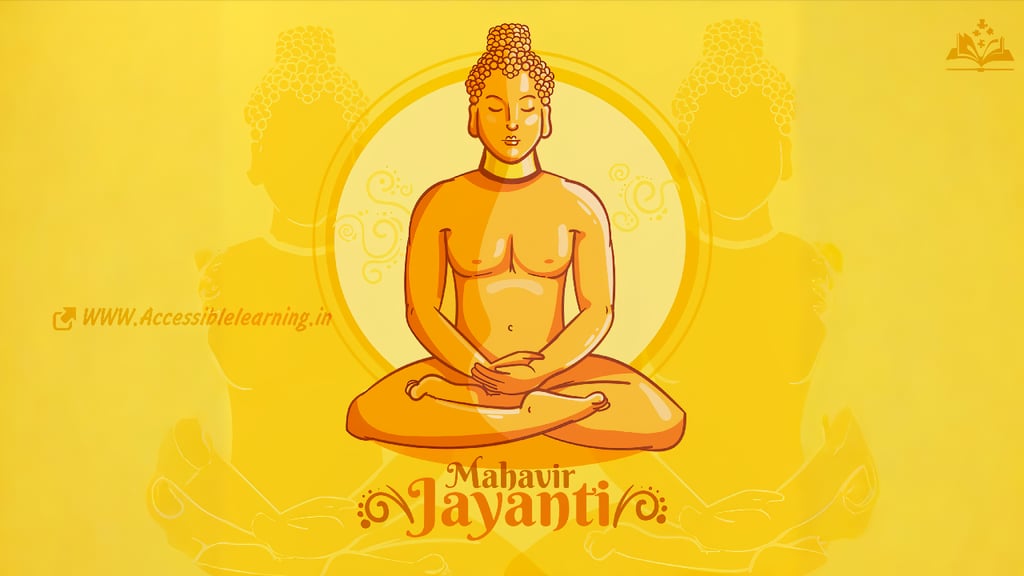
Mahavir Jayanti: The Sacred Celebration of Mahavir Ji’s Birth
Mahavir Jayanti is a sacred festival celebrating the birth of Mahavir Ji, the 24th Tirthankara of Jainism. This article explores the significance, history, celebrations, and teachings of Mahavir Ji, emphasizing his principles of non-violence, truth, and minimalism that continue to inspire people worldwide.
CULTURE/TRADITIONEVENT/SPECIALCELEBRATION/FESTIVALSINDIA/BHARAT
Keshav Jha
4/5/20253 min read


Mahavir Jayanti is one of the most significant festivals for Jains worldwide, commemorating the birth of Mahavir Ji, the 24th and last Tirthankara of Jainism. This auspicious day falls on the 13th day of the Chaitra month (March–April) as per the Hindu lunar calendar. Mahavir Ji’s teachings emphasize non-violence (Ahimsa), truth (Satya), non-possessiveness (Aparigraha), and self-discipline, which continue to inspire millions.
Mahavir Ji’s Life and Teachings
Although born into a royal family, Mahavir renounced worldly pleasures at the age of 30 and undertook severe penance for 12 years to attain Kevala Jnana (supreme knowledge or enlightenment). His philosophy revolved around non-violence, truth, celibacy, detachment, and non-stealing—principles that form the core of Jainism today.
Key Teachings of Mahavir Ji
Ahimsa (Non-Violence): Advocated peace and non-harm to any living being.
Satya (Truthfulness): Encouraged honesty in thoughts, words, and actions.
Asteya (Non-Stealing): Urged against taking anything that does not belong to oneself.
Brahmacharya (Celibacy): Emphasized self-control and moral discipline.
Aparigraha (Non-Possessiveness): Promoted detachment from materialistic desires.
Syadvada (Relativity of Truth): Encouraged understanding different perspectives without rigid absolutism.
Anekantavada (Multiplicity of Views): Taught that reality can be perceived in multiple ways, emphasizing tolerance and coexistence.
Self-Restraint (Sanyam): Advocated discipline and control over desires.
Compassion (Karuna): Encouraged kindness towards all living beings.
Forgiveness (Kshama): Promoted patience and letting go of grudges.

How Mahavir Jayanti is Celebrated
Mahavir Jayanti is a grand occasion marked with devotion and reverence by Jain communities across the world. The celebrations include:
Processions (Rath Yatras)
Grand chariot processions featuring an idol of Mahavir Ji are organized in temples.
Devotees chant bhajans and prayers while carrying holy banners.
Temple Rituals and Prayers
Jains visit temples early in the morning for Abhishek (ceremonial bathing of Mahavir’s idol).
Offerings of rice, milk, and sweets are made.
Discourses on Mahavir’s life and teachings are conducted.
Acts of Charity and Compassion
Donations of food, clothes, and money are made to the needy.
Many Jains organize free medical camps and distribute medicines.
Release of captive animals as an act of compassion.
Feeding stray animals and birds as a way to practice kindness.
Organizing blood donation camps to serve humanity.
Fasting and Spiritual Discourses
Many Jains observe strict fasts (Upvas) to purify their souls.
Lectures and sermons are held in temples and community centers.
Jain monks and scholars share insights on Mahavir’s teachings.
Some devotees practice Ekasana (eating only once a day) or Nirjal Upvas (complete fasting without water).
Recitation of Jain scriptures is done throughout the day.
Celebrations Across India and Beyond
In Gujarat and Rajasthan, grand processions are organized with elaborately decorated chariots and elephants.
In Maharashtra and Karnataka, free food distribution events are held for the underprivileged.
In the USA, UK, and Canada, Jain organizations host community prayers, meditation sessions, and cultural programs.
Special exhibitions and lectures are organized to spread awareness about Jain philosophy.
Significance of Mahavir Jayanti in Modern Times
In today’s fast-paced world, Mahavir’s teachings remain highly relevant. His message of non-violence and compassion promotes peace in a world plagued by conflict. His principle of Aparigraha (minimalism) encourages sustainable living, making it more relevant than ever in an age of environmental crisis.
Key Lessons for Today’s World
Non-violence as a solution to global conflicts.
Minimalism and sustainable living to protect nature.
Truth and honesty in daily life to build ethical societies.
Self-discipline and mindfulness for personal growth.
Respect for all living beings, including advocating for veganism and animal rights.
Mental and spiritual well-being through meditation and self-reflection.
Harmony among communities by fostering understanding and tolerance.
Mahavir Jayanti is more than just a religious festival; it is a day to reflect on the timeless wisdom of Mahavir Ji. His principles of non-violence, truth, and simplicity continue to guide individuals towards a peaceful and meaningful life. As we celebrate this sacred day, let us strive to integrate these values into our daily lives for a harmonious world.
"Live and Let Live." – Mahavir Ji
FAQs
Why is Mahavir Jayanti celebrated?
It marks the birth anniversary of Mahavir Ji, the 24th Tirthankara of Jainism.
How do Jains celebrate Mahavir Jayanti?
By visiting temples, performing rituals, organizing charity events, fasting, and listening to sermons.
What is the importance of Ahimsa in Jainism?
Ahimsa, or non-violence, is the core of Jain philosophy, advocating for peace and respect for all living beings.
What can we learn from Mahavir Ji’s teachings today?
His principles of truth, non-violence, self-discipline, and minimalism offer solutions for personal and global challenges.
How does Mahavir Jayanti promote social harmony?
By emphasizing tolerance, compassion, and respect for all beings, the festival encourages unity and non-discrimination among people of different backgrounds.
What is the significance of fasting on Mahavir Jayanti?
Fasting symbolizes self-discipline, purification, and detachment from material desires, helping devotees connect with spiritual growth.
How can we apply Mahavir’s teachings in daily life?
By practicing honesty, kindness, non-violence, and mindfulness in everyday actions, fostering peace and harmony in society.
Subscribe To Our Newsletter
All © Copyright reserved by Accessible-Learning Hub
| Terms & Conditions
Knowledge is power. Learn with Us. 📚


